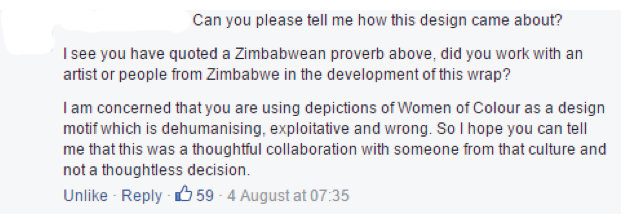“Designs like this perpetuate the stereotype that Africans all look a certain way, dress a certain way and carry their kids a certain way.”
A petition urging the business owner of an Italian company to stop selling a traditional baby wrap, known as “kanga” in East and Central Africa, has gathered more than a thousand signatures on Change.org.
The petition was started by Christelle Barrere-Collet, a Mauritian woman currently living in Perth, Western Australia. The 27-year-old thinks the baby wrap and its design is offensive to the African mothers whose ancestors have been using similar wraps to carry their babies on their back for centuries.
The design, which Christelle described as “stereotypical”, has caused anger among Facebook users. Christelle told the IPF:
“No one draws white mothers from a European village doing laundry or vacuuming on wraps, but people draw caricatures of African mothers on expensive wraps for white people to carry their white children in, and they think they are ’embracing’ my people that way.”
Christelle added: “Designs like this perpetuate the stereotype that Africans all look a certain way, dress a certain way and carry their kids a certain way.”
According to the petition, the Italian company, Amrita Fascia Portabebe, caused further offence when they announced the release of the wrap via Facebook on 23 July along with a Zimbabwean proverb. Despite the using a proverb from Zimbabwe — the dress, jewellery and pots used in the design “don’t look Zimbabwean at all”, Christelle said.
A few days after the release, Facebook users questioned whether the profits would go towards helping the Zimbabwean community. Others asked the company if they consulted with African artists to develop the design. One user wrote:
 The company confirmed there was no consultation with the African community when designing the wrap. Through Facebook, the company also said the profits from the baby wrap wouldn’t go to communities in African countries.
The company confirmed there was no consultation with the African community when designing the wrap. Through Facebook, the company also said the profits from the baby wrap wouldn’t go to communities in African countries.
Christelle believes the company wasn’t aware the baby wrap design would cause offence, but she still finds it “unbelievable that in 2016 a baby company isn’t aware of cultural appropriation” — the adoption or use of elements of an often oppressed culture, typically without consent, by members of another culture.
A Facebook user said:
 Since the petition was launched, the company hasn’t stopped selling the baby wrap, explaining that they created the design to celebrate “traditional baby wearing”. They told the IPF that they never sold “kanga”, but instead, are selling “woven baby wraps”, which they say “totally different from kanga material, dimnesion and design”.
Since the petition was launched, the company hasn’t stopped selling the baby wrap, explaining that they created the design to celebrate “traditional baby wearing”. They told the IPF that they never sold “kanga”, but instead, are selling “woven baby wraps”, which they say “totally different from kanga material, dimnesion and design”.
The company said: “The design comes from the awareness that there is a deep traditional knowledge that sometimes is put aside in thinking that the ‘modern way’ is always better.
“Sometimes African mothers [in Italy] leave the tradition to carry their babies, because they are scared people can see the nurturing practice as too obsolete and different from their culture.”
After days of receiving comments and direct messages the company stopped replying to anything regarding the baby wrap. They have also deleted the original Facebook post where most people expressed their concerns. Christelle doesn’t understand why the business owner keeps ignoring the people who signed the petition.
“My mothers, my aunties, my fellow African mothers—all have voices and the petition is for their voices to be heard.”
If the petition is successful, Christelle hopes Amrita Fascia Portabebe will pull the baby wrap off the market. She also wanted to use this as an opportunity to raise awareness around cultural appropriation. She thinks there are other ways to celebrate African women, including by giving them a platform to showcase their work and educating customers on Africa’s diversity and history.
“Objectifying our identity for profit and fashion-needs is an attack on our humanity and it takes us back to slavery times where we were treated as commodities,” she said.
“This petition is highlighting this issue, an issue that indigenous communities do not have the opportunity to talk about often in public.”
To find out more about Christelle’s concerns and support her cause, visit the petition page.

